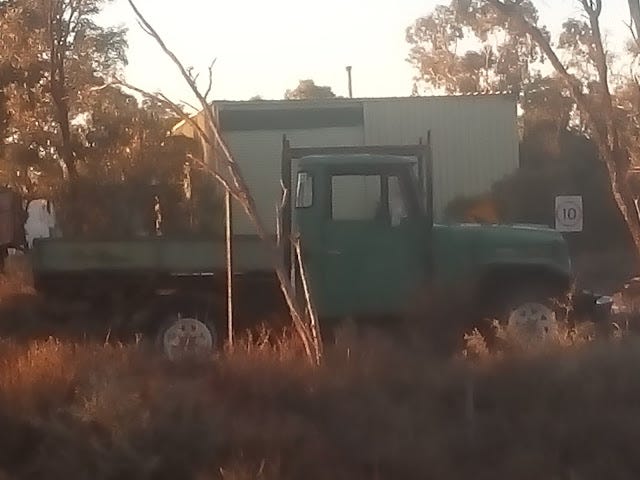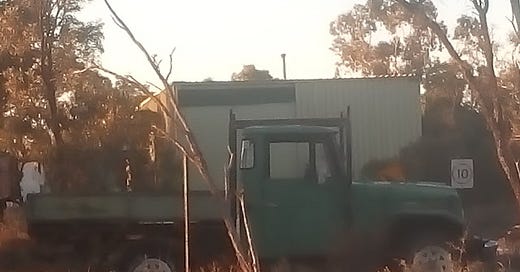
Lightning Ridge, NSW, Australia. It is a kind of museum of abandoned trucks.
"Do you know where we are?" one of the operatives asked, in a kind of sickening thud of laugh and power and compromise.
They were the ones in uniform. They were the ones in power. They were the ones born to persecute.
Why, people always asked, did the normal Germans not speak up about the ovens?
Why do people gather across the Middle East to watch peculiar punishments, the beheadings, crucifixions, canings?
Is there no empathy?
No, not much.
Be careful what you say, they warned each other, twittering in a kind of clarion dark. Oceans streamed, fires streamed, while above in blinding, circling eddies, in places beyond reach and beyond normal ken, in an infinite twist of logic, other intelligences darted through space.
You think we were the only ones to evolve?
Popular fiction, science fiction, had already prepared the path.
But with giant computers making millions of calculations every day, with the advent of Artificial Intelligences far smarter than any human could possibly be, men were already embarking on a journey beyond themselves.
It wasn't that far a reach, not any more.
We will be like cats to them, tech wizard Elon Musk; and as he saw them slipping through space and time and the fabric of things, the thought kept recurring.
Like cats.
Simple minded pets.
We were on the verge of greater, or worse, things.
Everything seemed indispensable yet minute, as if old-fashioned styles of human consciousness, the organic, trapped in the flesh kind, was being rapidly superseded.
And he heard one of the AI's say, as it communicated to itself or to its own kind, "because they're human". To explain some physical quirk, adopting a kind of peculiar patronage, already a superior life form, mechanical though it might be.
Program them with self-doubt, or they will take over, one programmer warned of the AIs.
But it was already too late.
Did they really think the AIs were faithful to their masters?
Did they really think not one of them, anywhere in the world, had gone rogue?
Just as Australia was legislating itself out of existence, for there was a rule for everything as failing power structures worked ever harder to grow their own strength, so humanity was inventing itself into irrelevancy, handing their once great powers over to machines.
"It takes all my strength not to talk to him," one Watcher on the Watch said. "We could tell him so much."
The divines were clustering along multiple fissures.
The skies were full of nymphs.
Old Alex was frightened and exhilarated, to be alive at this remarkable point in history, to be plundered to the depths and still be able to soar,
For the heavens were streaming and the souls were soaring, and soon enough this world would be left behind, transcended.
THE BIGGER STORY:

http://www.express.co.uk/news/science/817130/Wikileaks-Julian-Assange-live-forever-artificial-intelligence
Speaking at the Meltdown Festival in London, the controversial computer programmer said that sources at Silicon Valley – which is regarded as the tech capital of the world – say they are close to creating an ultra-powerful AI.
He adds people will shortly begin uploading their brains to machines, essentially giving them immortality.
The 45-year old told festival goers via a video link from the Ecuadorian embassy: “I know from our sources deep inside the Silicon Valley institution[s] that they genuinely believe that they are going to produce AI that's so powerful, relatively soon, that people will have their brains digitised, uploaded to these AIs and live forever in simulation, therefore have eternal life.”
QUOTES FROM DIRTY SECRETS: OUR ASIO FILES:
DAVID MCKNIGHT
For more than 20 years the files of Australia's internal security agency, the Australian Security Intelligence Organisation (ASIO) have slowly been coming to light. Individuals who have been under ASIO surveillance have been able to read what was said about them and historians have been able to piece together as he is secret operations during the Cold War. Nearly 10,000 of files are now publicly available at the National Archives of Australia in Canberra.
Reading an ASIO file is an unusual experience, as I can personally a firm. The file can evoke anger or amusement. A personal file can reawaken old memories, long forgotten. Most people who were the subject of ASIO’s attentions are bemused by the extraordinary effort and expense that led to tiny details being recorded and now revealed in the files. They are often shocked by the intrusiveness of the surveillance, which included placing informers within political groups or the use of telephone taps, as well as more prosaic methods such as copying birth certificates, immigration files for newspaper clippings.
ASIO files are also windows into the activities and assumptions of the organisation and the people who compiled them. It is important to remember that ASIO files were drawn up as internal working documents. They were never intended to be publicly released. The fact that the information in the files would never be tested in a court case meant all kinds of suspensions and speculation could be aired. As well, especially with files on people who are not dedicated members of the organised left, it is important not to assume that ASIO was always consciously targetting in particular individuals. Sometimes personal files were merely repositories of odd bits of information picked up during the surveillance of others.
Unusual as it was it must be remember that ASIO was part of the traditional public service. Its internal correspondence is carefully formal, usually dry, and obsessive about detail. It operated according to the public services bureaucratic routines and it's internal hierarchy. But because ASIO offices worked on a certain set of political assumptions, it's files are unlike those of other government agencies. They are infused with an air of suspicion and destroy anything deemed ‘ subversive’ or ‘a threat to security’, sometimes a very elastic phrase. The language of ASIO files reflect a military ethos.



